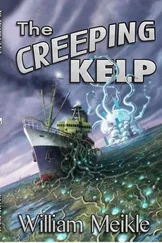“I wonder if any living person saw us ,” Lockwood said. “Never thought to ask.”
“So what I’m interested in,” George went on, “is whether anyone’s stirred them up like that before. And if so”—he gestured with a mustard spoon at the map on the wall, the one showing the concentric spread of historic hauntings across the country—“what effect it’s had on the Problem.”
The doorbell rang. Holly was closest. She disappeared into the hall.
“Big mysteries,” Kipps mused. “Going to be tough to solve.”
“Have confidence, Quill,” Lockwood said. “With the team we’ve got, I think we’ll do just fine.” He stretched back in his chair. “Who was at the door, Hol?”
Holly had reappeared, and in the instant before she spoke, we all noticed how pale she was, and how stiff her expression. “We have two visitors, Lockwood,” she said. “I didn’t…I couldn’t…Well, I mean to say, they’re here right now. I’ve had to let them in.”
She stood aside. Behind her, smiling her glossy smile, was Penelope Fittes.
Ms. Fittes stepped into the kitchen. It was a small room, and there wasn’t much space for her. She gazed around at the debris of our meal. She wore a green dress, mid-length, with a dark brown coat on top. As always, she might have been on her way to a dinner party. “Good morning, everyone,” she said. “I hope I’m not intruding. May I come in?”
Well, she already had , of course. Lockwood jumped up. “Of course, of course. Please—”
“Just a little visit. No, don’t get up. I wouldn’t want to disturb you. I do have someone else with me, too.” She gestured behind her at a slim young gentleman, with curly blond hair and a neatly groomed mustache, standing in the shadows of the hall. He wore an elegant tweed suit and had a sword-stick hanging at his side. “You know Sir Rupert Gale, I think? An old friend of the Fittes family.”
“Yes, indeed…yes. I’m sorry about the mess here,” Lockwood said. “Shall we go into the living room?”
Ms. Fittes gave a smile. “No, no. I’d like to see where you do your work in your little agency. What a busy breakfast you’ve been having! And this tablecloth, with all these sketches…” She leaned forward to inspect them. “So quaint! So charming…well, possibly not those doodles there.”
Lockwood was hurrying over with a spare chair. “I’m sorry. I keep telling George to stick to ghosts. Please sit, ma’am. Sir Rupert, would you care to have mine?”
“No, no thank you. I’m good.” Sir Rupert Gale took up position at the window. He leaned back against the sink and crossed one ankle over the other.
It was no great pleasure for us to have Sir Rupert in our house, since we knew him to be a rogue and a wealthy collector of illicit relics. His past encounters with us had been laced with the threat of violence. But in truth, having Penelope Fittes there was more disconcerting still.
This most illustrious person sat in our private space, smiling at us. The chair that she occupied was a fold-out wicker one, rather inexpensive, with a few ectoplasm burns along the back where it had played a part in one of George’s experiments. Nevertheless, with her long limbs elegantly arranged upon it, and the sunlight shining on her emerald dress, the lady somehow made it look quite chic. She seemed at perfect ease. By contrast, we all sat (or stood) in nonplussed silence. Kipps in particular looked thoroughly mortified. He subtly insinuated himself behind the door, trying to keep out of sight.
Lockwood shook his confusion away. “Tea, ma’am? The pot’s just brewed.”
“Thank you, Anthony. I’ll take a cup.”
As the necessary formalities were completed, Ms. Fittes gazed around the kitchen, her eyes taking in every detail—the remains of breakfast, the salt and iron in the corner, the door to the garden, George’s map of England on the wall. “I’ve come here to thank you,” she said. “To thank you for your services. It’s really been most kind of you.”
“Services, ma’am?” Lockwood passed the tea over.
“I see you’ve been reading the papers.” She indicated the front page of the Times . “You’ll have gathered that there are many changes happening in London. In particular, you may have heard that the Rotwell and Fittes agencies are entering an association. Well, I can tell you unofficially that it will be more than that. It is a merger. Rotwell’s is disgraced and in crisis; without swift action, it will fail. So, from now on it will be fully assimilated into the Fittes Agency. That means it is part of Fittes, and its executives will report to me.”
She looked around at us, this woman who now controlled the two largest and most powerful organizations in London. “Congratulations, ma’am,” Lockwood said slowly. “That’s…really quite something.”
“Indeed. It is an outcome for the books. Much work lies ahead for me if I’m to knock Rotwell’s into shape, but I am confident this can be done. At any rate, I am in charge of both agencies now. And I believe that I owe much of my good fortune to you.”
It was one of those moments when everyone works so hard to look innocent and uncomprehending that the atmosphere at once becomes poisonous with knowingness and guilt. Over at the sink, Sir Rupert Gale smiled; he picked up one of George’s favorite striped mugs and considered it idly.
“Pardon me, ma’am,” Lockwood said. “I don’t quite understand. We happened to be working in a village quite nearby, yes, but as to the events at the institute, and the cause of the disaster—if, if that’s what you’re referring to—we’re in the dark, just like everyone else.”
Ms. Fittes had an odd little laugh; I’d forgotten just how low and husky it was. “That’s all right. I’m not that silly Inspector Barnes. You don’t have to be careful with me . But there, I won’t press you. Let us just imagine, for a moment, that you saw things you were not supposed to see. Perhaps they confused you. Perhaps they still prey on your minds.”
It was obvious what she was talking about, but having denied it at the outset, we couldn’t very well admit to anything now. Lockwood pretended to consider. “We did come upon some very frightening apparitions in the village. George in particular ran a mile from an eyeless girl—isn’t that right, George?”
“I left her in the dust,” George said.
The lady smiled at us. “You’re very droll. Suffice it to say that some of the Rotwell scientists—I wonder, should I call them Fittes scientists now?—some of the workers at the institute have been talking to the police. There was mention of intruders.”
“Five intruders,” Sir Rupert Gale said. “Count them. Fingers of one hand.”
“Now, I don’t know precisely what it is you saw or heard,” Ms. Fittes said, “but I would advise you to cast it from your minds. Poor Steve Rotwell was an eccentric, driven man who desired strange knowledge that is forbidden to us all. What dark experiments he may have chosen to attempt in his private facility are not for us to fathom. Certainly they should be of no consequence to any law-abiding agency.”
We sat in silence, trying to gauge her words. Up by the sink the dishcloth hung dark and quiet, too. I could see a glimpse of the jar, but no stirrings within. At least the skull was keeping out of it. That was one blessing.
Lockwood spoke quietly. “I think I understand you. You’re requesting that we ‘forget’ anything we may or may not have seen.”
“‘Requesting’ isn’t the word I would have chosen—but, yes, that’s right.”
“May I ask why?”
The lady sipped her tea. “For fifty years,” she said, “we have been at war with supernatural forces. Tampering with them, or seeking to turn them to personal gain, as the foolish Rotwell did, is a recipe for spiritual disaster. The mysteries of death are sacrosanct, and must not be explored.” Penelope Fittes regarded us. “I think you know that as well as I do. Some things are better left unknown.”
Читать дальше









